This page is dedicated to sociological insights one can learn from comic books---specifically, superhero comics from the 1940s through, oh, say the 1980s. I'm a fairly recent reader of comic books, having picked up Frank Miller's The Dark Knight Returns in my undergrad years around 1990 or so. I hated superheroes as a kid (except the Batman, but I still didn't read his comics). After giving them a second try in college, I decided to buy a few more.
I am very cheap, so I tend to buy older re-issues (like the Marvel "Essential" series) or seconds (like my copies of Kingdom Come and the Return of Superman). The older stuff is great, but confusing. It is as if the comic book authors had never met other humans in real-life situations. The reactions of the characters are just utterly bizarre.
Unfortunately, Marvel tends to price their stuff cheaper, so I've got more of the older "Essential" books than the DC books, which I prefer. Marvel's 1960s stuff is filled with whining (sorry, "angst-filled") and misunderstood heroes. Oh, look, they think the Hulk is bad. That's so sad. Oh, look, they think that Spiderman is bad, too. And the Silver Surfer. And so on. Gets old quick.
Marvel makes up for it by senselessly changing the basic features of the superheroes willy-nilly. One week, the Hulk is just the Hulk and Banner is dead, and the next week, Banner is back but he turns into the Hulk if he steps on a dairy product. I guess that everything seems a bit more jarring when one reads one story after another, rather than in the serial form in which it was first published, but it's pretty hard to keep up.
Anyway, I know far too little about comic books to give a proper rant here. I'll leave that for the real comic book guys. I'm not qualified. Instead, I want to just reproduce a couple of the sociological lessons I've learned from comic books.
If you want to start down that dark path of comics expert yourself, you might check out these Batman and Superman sites, which reproduces some great (and odd) stories. Be sure to check out the Super-Sons stories. Very odd. (And a penthouse for Batman? What were they thinking? Batcave, man! Batcave!)
This page will be updated slowly, as the mood strikes me.
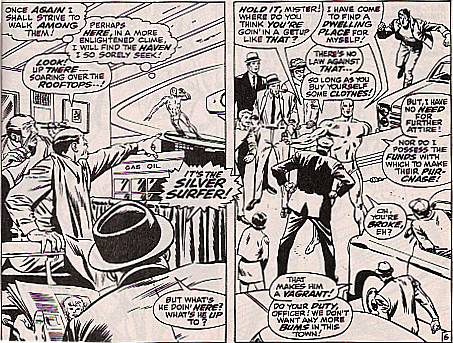
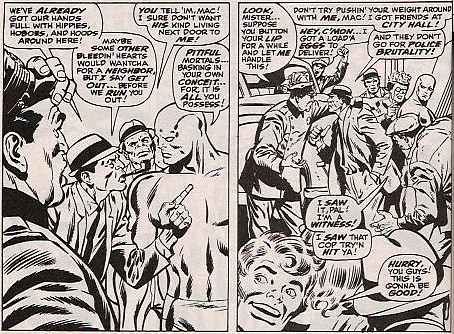
Background: The Silver Surfer is a Marvel comic. Hence, he is misunderstood and the whole world thinks that he's a bad guy. Just like every other Marvel hero.
The Lesson: But he's also very powerful -- cosmically powerful (whatever). Still, if you see a big, powerful, silver guy coming to your town, do what all upright pipe smokers do. Tell him you don't want no bums 'round here. It helps if you can focus the message, but as we see here, it's okay if you get a little distracted with marginally related political issues. The silver guy will probably leave anyway.
The neighborhood is saved.

Background: Typical disguised superhero with puny alter-ego. In this case, cowboy hero Johnny Thunder is the (perfectly human) hero and wimpy schoolteacher John Tane his alter ego.
The Lesson:How does he do it with no mask? Living in the presence of his own father who somehow doesn't suspect Johnny Thunder is his son? How did he even train to become an expert gunslinger without folks noticing? Sorry, no idea. I have only one story from this series.
But I think this strip offers part of the answer. I mean, obviously everyone knows, right? They have to... unless they really don't want to.
Notice that last panel. The mustached man is the Greek chorus here, enforcing the denial that afflicts the crowd. The other guy just mentions a what-if, but the enforcer immediately reminds everyone what they need to believe: that Johnny isn't John.
So how come dear ol' Dad doesn't want to acknowledge the truth, despite his comments to the contrary? And why does everyone prefer the denial? Sorry, I got just one story. But I have faith that the other Johnny Thunder stories bear me out here.
(I also wonder how come the John the schoolteacher is shunned as a wimp when Johnny the gunslinger dresses as the gay caballero, but never mind. I guess if you're quick on the draw, folks don't make Village People jokes.)
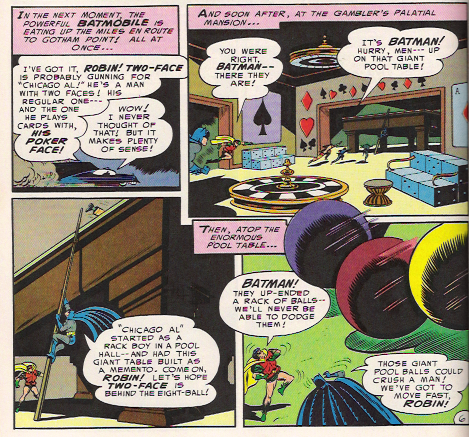
Background: This is Batman. If you need background, well, I got nothing to say here. C'mon. Batman.
The Lesson:Anyway, if I learned anything from Batman, it is that rich people like big things. Really big things. That and trigonometry can save your life.
If I learned anything from Robin, it's that sucking up to your bosses (like here) might also save your life next time you're in a deathtrap. "Golly, that makes lots of sense!!!!"
The things that the various Bat-villians teach one about deathtraps and not leaving before the good guy is dead are well-known and don't need to be mentioned here. But have been.
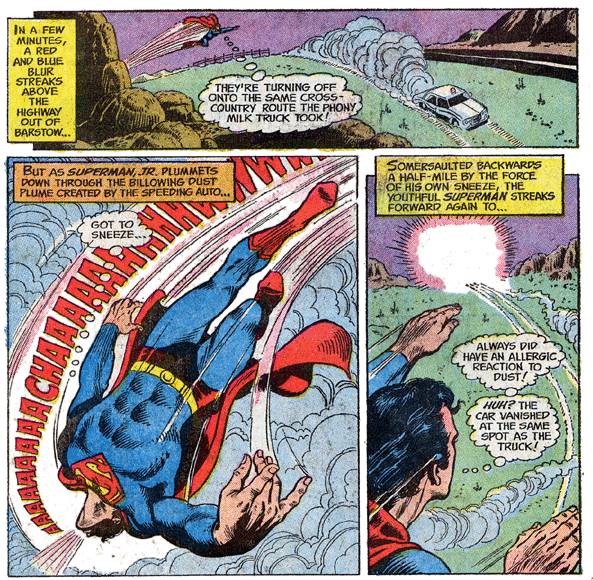
Background: This is not Superman. It is his son. No, really. Apparently, in the 1970s, Bob Haney decided to make hip versions of Superman and Batman by giving them rebellious offspring. Either that, or he decided to show that one can write less plausible slang than Stan Kirby. Anyway, this is half of the outcome: Clark Kent, Jr., a teenager with half the powers of dear ol' dad but twice the angst.
The Lesson: Hayfever sucks. Believe me, it sucks. But even being a superhero doesn't help. See, nature has a way of compensating. No matter how great you are, the troubles you face increase at a similar rate, so you just can't win. Everyone has problems at a more or less constant severity.
Well, not everyone. Sure, if you're half human, then you might have hayfever. But Clark Kent, Sr. doesn't have problems like that, no sir. Hell, death doesn't keep him down. Spoiled bastard.
Batman could still kick his ass.
Anyway, eventually someone sober at DC read one of these stories involving the Super-Sons. The result: a quick strip claiming that all of this was just an computer simulation in Superman's fortress. No, really. Just a remarkably engrossing game of The Sims.
Well, beats the whole "it was just a dream" season on Dallas anyway.
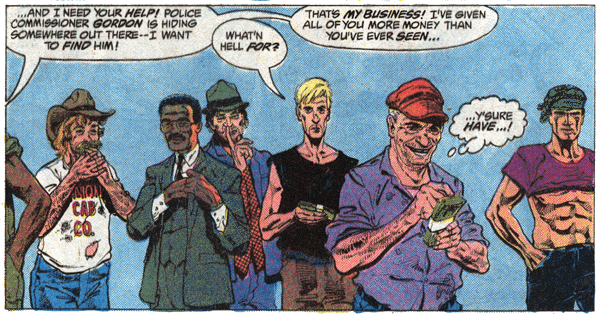
Background: From a Batman story featuring a one-shot enemy (not pictured). Obviously, he is here trying to purchase the services of the scum of Gotham. And just as obviously, that's Johnnie Cochran pocketing cash for services rendered.
The Lesson: I don't think I can state the lesson without speaking ill of the deceased. You'll have to wait until Cochran has been in the grave a bit longer before I state the obvious here.
Well, I could avoid this issue by speaking in generalities, some lesson about lawyers perhaps. But somehow, the general lesson is oddly more obvious than its specific and distasteful corollary. So I won't even mention it.
In all honesty, I don't know why Cochran appears in this picture. Anyone that can explain it can drop me a line.
But you can't tell me that ain't him. We might argue about Robbie Robertson picking his nose in the background, but that's Cochran.
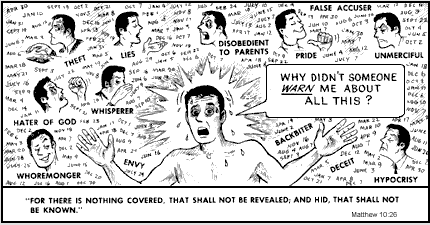
Background: Okay, maybe a consistent man wouldn't mention Jack Chick here, since he doesn't do superheroes. And maybe a proud man wouldn't lob a joke at such an easy straight man anyway.
But I'm neither consistent nor proud. Especially not proud. That's a sin, that one is. And it's not a particularly good sin, as sins go.
The Lesson: The lesson is, of course, that you should cut out all that sinning and devote yourself to Jesus. That's the primary lesson, anyway.
But there seems to be a secondary lesson hiding in there. Look at all the pictures. Each of those sinners looks distasteful, someone you just wouldn't want to be or be with. Except the whoremonger. He's got it together, baby! Suave, sophisticated, confident. No doubt: whoremongering is the way to go.
Well, pride's not too bad. A bit smarmy, but he might be okay as a bowling partner. Not like disobedient to parents. He's just a jerk. And lies seems to have both disobedient and hater of God pissed at him, so don't do that. Okay, so maybe whoremongering and then pride and forget the rest.
Wait, that's a bit off-message. If you choose a life of sin, then you will suffer for eternity, so don't do that.
Still, if you had to do the sin thing...
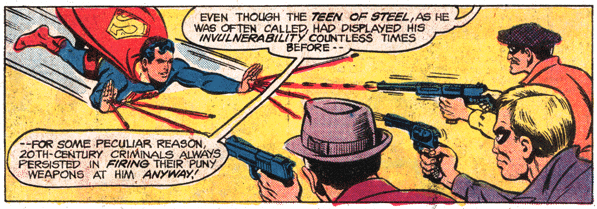
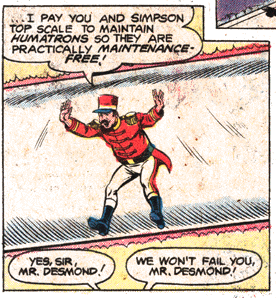
Background: From The Town That Time Remembered. Superboy goes joy-riding in the future and discovers a replica Smallville in the 52nd century. The replica is a theme park dedicated to Superboy and complete with Chuck E. Cheese-style simulations.
The Lesson: People in the future mock us. They mock our bad guys anyway, who inevitably fire all their bullets at our protector from Krypton. Then, in the old T.V. show anyway, they throw the gun at Superman. Just in case, you know, maybe he's invulnerable to bullets but not hurled objects. Yeah, it's stupid. So? Big-headed swells from the future...
Anyway, what makes them so smart? Evidently nothing. At least the little guy running the park seems to throw money away. It's not at all clear to me what service he's buying, but either he's paying lots of bucks for unneeded maintenance or he thinks that if you maintain something a whole lot, then you don't need to maintain it at all.
Well, maybe he's not stupid. I never really got those Zen things.
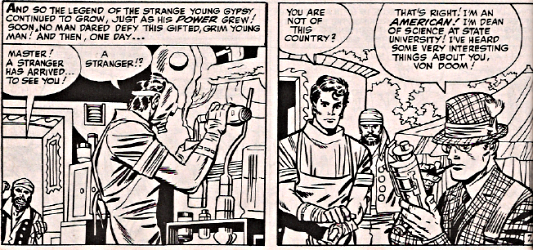
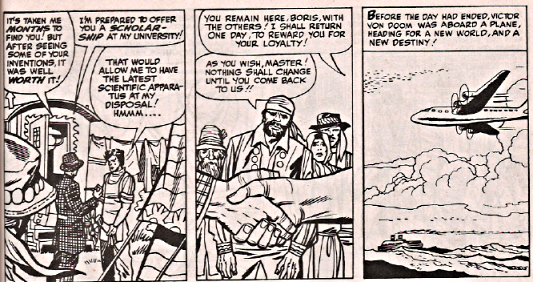
Background: Victor von Doom, a gypsy and scientific genius, is visited by a nattily dressed American representing State University. In a Dickensian coincidence, future Fantastic Four members and von Doom arch-enemies Reed Richards and Ben Grimm go to State University, too!
The Lesson: Branding is important, even for universities. State University is deeply committed to the sciences, as the dean's work in recruiting von Doom shows. Indeed, with von Doom and Richards, State U's undergraduate program in Matter Transmutation and Dimension Warps was second to none.
But State University could not escape its reputation as a jock school. Sure, they had Grimm, the Touchdown King, but athletics was only one facet of this pillar of academic excellence.
What the school needs is a rebranding, a conscious attempt to make a name and reputation for itself. Something playing up its ties to the community and its stature as an academic powerhouse. To begin, it should lose the utterly generic name and adopt something fresh and new. Something a little more geographically specific.
Like, oh, Central State University. That might do it.